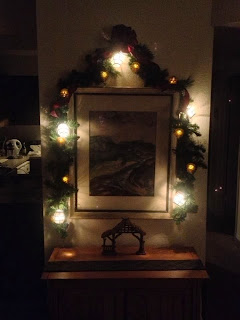A colleague of mine took a job in Arizona last summer. He's a talented and ambitious young sacred musician, fully committed to the restoration of orthodoxy to the culture of the Catholic Church in the 21st century.
I've been disturbed by reports he's been posting to Facebook, complete with photos of "hate mail" he and his Pastor have received in reaction to the work he's doing.
Here are some examples:
It's truly amazing that people would write such hateful, ignorant, manipulative stuff.
What is more amazing is that since the reforms of the Second Vatican Council were implemented, the Catholic Church has tragically lost so much of what made its cultural identity unique. The "leadership" of the Church incredulously wrings its hands and wonders out loud why there's a crisis of faith and a crisis of vocations to the priesthood and religious life
in the face of growing numbers of young people joining religious orders and pursuing priestly vocations associated with Magisterial fidelity and orthodox liturgical practice. But that's for another time.
What is important, and what impressed me, was my friend's response in the Facebook discussion thread regarding the typewritten note. They were words I needed, and not because I'm facing obstruction or resistance anything close to this kind of vitriol. They were needed because those of us who are committed to this cause are easily dispirited in the work we've undertaken when faced with such selfishness.
He said,
These
letters really don't bother me. We're called to be faithful, not
successful, so I shall try to stay faithful in carrying out my mission.
The rule of thirds is applicable at my parish, I believe. ⅓ of the people will like you, ⅓ won't, and ⅓ won't care.
We
simply have to do the right thing and trust in God. The sacred liturgy
is Christ's work, not ours. The liturgy is not something we do, it's
something that God is doing in our presence. It is not for cardinals,
popes, bishops, or any of us, to do things with the liturgy. Rather, it
is our privilege and duty to join in the liturgy as it has been handed
on to us and to allow it, to allow Christ working in and through it, to
do things with us!
Well said.
If your music director is working to reclaim our unique Catholic identity as expressed in orthodox musical practice, thank him or her for their commitment
and let your Pastor know that you appreciate the work the music director is doing as well!
Pastors often
only get rambling emails, viturperous voice mail messages or noisome green-ink letters like the ones shown above. And some, out of a sense of desperation or frustration, err on the side of compromise in the one area that they feel they can, without violating Church Teaching, in the name of pastoral sensitivity. They need to know that the efforts to restore chant and polyphony to the Mass are worthwhile, and that people (who take their faith seriously)
do want reverent, prayerful, and truly Catholic music in their liturgical celebrations. They also need to know that sacred musicians are not just temperamental egoists who do what they do for personal adulation or who make their choices based on effete and eccentric tastes. Truly educated sacred musicians understand that the Mass and its music are part and parcel of an unbroken tradition. Priests need to understand that the cultural battles of our time go well beyond the cries for same-sex marriage, ordination of women and the evils of abortion and contraception.
Support your sacred musician, and let your Pastor know that you appreciate what he or she is doing!




